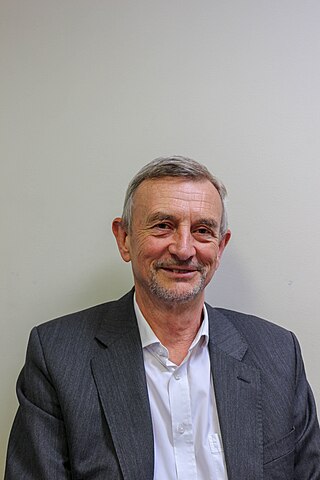Related Research Articles
Angela Vincent is Emeritus professor at the University of Oxford and a Fellow of Somerville College, Oxford.
Orla Hardiman (BSc MB BCh BAO MD FRCPI FAAN FTCD MRIA is an Irish consultant neurologist. She was appointed Professor of Neurology by Trinity College University of Dublin in 2014, where she heads the Academic Unit of Neurology, housed in Trinity Biomedical Sciences Institute. She leads a team of over 40 researchers focusing on clinical and translational aspects of amyotrophic lateral sclerosis and related neurodegenerations. She was the Health Service Executive National Clinical Lead for Neurology between 2019 and 2024. Hardiman has become a prominent advocate for neurological patients in Ireland, and for patients within the Irish health system generally. She was a co-founder of the Neurological Alliance of Ireland, an umbrella organisation for over 24 advocacy groups in Ireland.
Gillian Patricia Bates FMedSci FRS is a British biologist. She is distinguished for her research into the molecular basis of Huntington's disease and in 1998 was awarded the GlaxoSmithKline Prize as a co-discoverer of the cause of this disease. As of 2016, she is Professor of Neurogenetics at UCL Institute of Neurology and the co-director of UCL Huntington's Disease Centre.
Alastair Buchan is a British neurologist and researcher in stroke medicine. His main research interest is how to make neuroprotection a reality in the clinic. From October 2008 until January 2017, he served as the Dean of Medicine and the Head of the Medical Sciences Division, University of Oxford. He currently holds the Chair of Stroke Research at the University of Oxford.

The UCL Queen Square Institute of Neurology is an institute within the Faculty of Brain Sciences of University College London (UCL) and is located in London, United Kingdom. Together with the National Hospital for Neurology and Neurosurgery, an adjacent facility with which it cooperates closely, the institute forms a major centre for teaching, training and research in neurology and allied clinical and basic neurosciences.
Anke Ehlers is a German psychologist and expert in post-traumatic stress disorder (PTSD). She is a Fellow of the major science academies of the UK and Germany.

Elizabeth Matilda Tansey is an Emerita Professor of the history of medicine and former neurochemist, best known for her role in the Wellcome Trust's witness seminars. She previously worked at Queen Mary University of London (QMUL).
Dame Anne Mandall Johnson DBE FMedSci is a British epidemiologist, known for her work in public health, especially the areas of HIV, sexually transmitted infections and infectious diseases.
Edward Thomas Bullmore, is a British neuropsychiatrist, neuroscientist and academic. Since 1999, he has been Professor of Psychiatry at the University of Cambridge and was Head of the Department of Psychiatry between 2014 and 2021. In 2005, he became Vice-President of Experimental Medicine at GlaxoSmithKline while maintaining his post at University of Cambridge.
Christopher Edward Dennistoun Shaw MBChB, MD, FRACP, FRCP (Hon), FMedSci, FANA is Professor of Neurology and Neurogenetics at the Institute of Psychiatry, Psychology and Neuroscience, King's College London. He is also Head of the Department of Basic and Clinical Neuroscience, Director of the Maurice Wohl Clinical Neuroscience Institute at King's College London and an Honorary Consultant Neurologist and Neurogeneticist at King's College Hospital. His major research interest is in the genetic, molecular and cellular basis of motor neuron diseases such as amyotrophic lateral sclerosis (ALS).
Dame Moira Katherine Brigid Whyte FERS is a Scottish physician and medical researcher who is the Sir John Crofton Professor of Respiratory Medicine at the University of Edinburgh. She was the Director the Medical Research Council Centre for Inflammation Research and was Vice-Principal and Head of the College of Medicine and Veterinary Medicine at the University of Edinburgh. Whyte is also a trustee of Cancer Research UK.
Sir Douglass Matthew Turnbull is Professor of Neurology at Newcastle University, an Honorary Consultant Neurologist at Newcastle upon Tyne Hospitals NHS Foundation Trust and a director of the Wellcome Trust Centre for Mitochondrial Research.

Dimitri Michael Kullmann is a professor of neurology at the UCL Institute of Neurology, University College London (UCL), and leads the synaptopathies initiative funded by the Wellcome Trust. Kullmann is a member of the Queen Square Institute of Neurology Department of Clinical and Experimental Epilepsy and a consultant neurologist at the National Hospital for Neurology and Neurosurgery.

Irene Mary Carmel Tracey is Vice-Chancellor of the University of Oxford and former Warden of Merton College, Oxford. She is also Professor of Anaesthetic Neuroscience in the Nuffield Department of Clinical Neurosciences and formerly Pro-Vice-Chancellor at the University of Oxford. She is a co-founder of the Oxford Centre for Functional Magnetic Resonance Imaging of the Brain (FMRIB), now the Wellcome Centre for Integrative Neuroimaging. Her team’s research is focused on the neuroscience of pain, specifically pain perception and analgesia as well as how anaesthetics produce altered states of consciousness. Her team uses multidisciplinary approaches including neuroimaging.

Martin Neil Rossor, is a British clinical neurologist with a specialty interest in degenerative dementias and familial disease.
Alan J. Thompson, MD, FMedSci, FRCP, FRCPI, is Dean of the Faculty of Brain Sciences at UCL; Pro-Provost for London at UCL; Garfield Weston Professor of Clinical Neurology and Neurorehabilitation at the UCL Queen Square Institute of Neurology. He is also a consultant neurologist at the University College London NHS Hospitals Foundation Trust working at the National Hospital for Neurology and Neurosurgery. He is Editor-in-Chief for Multiple Sclerosis Journal.
Ammar Al-Chalabi is Professor of Neurology and Complex Disease Genetics at the Maurice Wohl Clinical Neuroscience Institute at King's College London, where he is also head of the Department of Basic and Clinical Neuroscience and Director of the King's Motor Neuron Disease Research Centre. In 2020, he received the Forbes Norris Award from the International Alliance Of Als/Mnd Associations and was a co-winner of the Healey Center International Prize for Innovation in ALS. His other awards include the Sheila Essey Award from the American Academy of Neurology and the Charcot Young Investigator Award from the Motor Neurone Disease Association. In 2021 he was appointed Senior Investigator at the National Institute for Health Research (NIHR).
Catarina Resende de Oliveira is a Portuguese neurologist, researcher, university professor, and doctor. A full professor of biochemistry at the Faculty of Medicine of the University of Coimbra, she studies the processes that cause neurological degeneration responsible for illnesses such as Alzheimer's disease and Parkinson's disease.
Professor Patrick Francis Chinnery, FRCP, FRCPath, FMedSci, is a neurologist, clinician scientist, and Wellcome Trust Principal Research Fellow based in the Medical Research Council Mitochondrial Biology Unit and the University of Cambridge, where he is also Professor of Neurology and Head of the Department of Clinical Neurosciences.

Masud Husain FMedSci is a clinical neurologist and neuroscientist working in the UK. He is Professor of Neurology & Cognitive Neuroscience at the Nuffield Department of Clinical Neurosciences and Departmental of Experimental Psychology, University of Oxford, a Professorial Fellow at New College, Oxford, and Editor-in-Chief of the journal Brain. He was born in East Pakistan.
References
- 1 2 3 4 5 "Professor Dame Pamela J Shaw". University of Sheffield. 26 May 2021. Retrieved 25 June 2021.
- ↑ "Meet our Team | Sheffield Biomedical Research Centre". NIHR - Sheffield. Retrieved 1 March 2022.
- 1 2 3 "Dame Pamela Shaw DBE FMedSci". Academy of Medical Sciences. Archived from the original on 1 August 2016. Retrieved 13 June 2015.
- ↑ "Professor Pamela Shaw - SITraN". sitran.org. Retrieved 1 March 2022.
- ↑ "11 Academy Fellows recognised in New Year's Honours 2014". Academy of Medical Sciences. Retrieved 25 June 2021.
- ↑ "Professor Dame Pamela Shaw delivers the GL Brown Prize Lecture 2019". University of Oxford. Retrieved 25 June 2021.